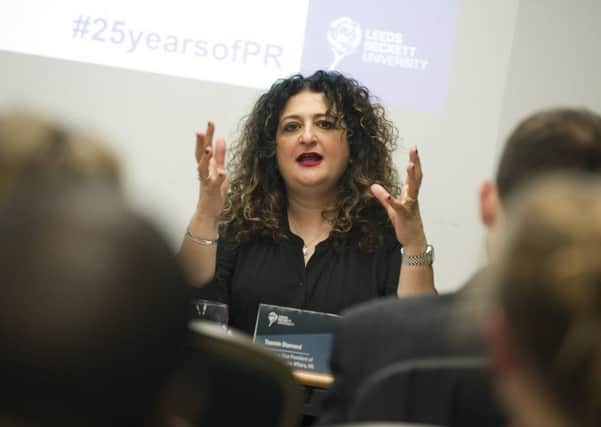Fake news has taken sinister twist, says executive


Leeds Beckett University hosted a panel discussion on the topic of fake news and the role of the public relations industry in the modern news environment.
Yasmin Diamond, executive vice-president of global corporate affairs at InterContinental Hotels Group, was one of the speakers on the panel.
Advertisement
Hide AdAdvertisement
Hide AdShe said: “I actually think that fake news has always been there. If you look there’s been publications dedicated to fake news like The Onion. You could say some of the red tops in their times were dedicated to fake news.
“However, in the last maybe year, year and a half, it has turned slightly more sinister. The reason why I use the word sinister is because it has moved into the phase of looking at influencing quite significant and seismic shifts in the political agenda.”
Sean Dodson, senior journalism lecturer at Leeds Beckett University, said that fake news was a specifically new phenomenon. He said: “Falsehood has always existed in the media and people have always lied in the media and lied to the media. False news is something different.
“This is material that is totally false on a different level. It’s made initially for mischief.
Advertisement
Hide AdAdvertisement
Hide Ad“The people who are writing it know exactly that it is 100 per cent false. They’re doing it to make money.
“It’s mischievous to begin with but it has very sinister implications because this material is now being spread through social media and it is believed by a large amount of the public.”
The event was held to mark the 25th anniversary of the PR course at Leeds Beckett University.
Jason Mackenzie, president of the Chartered Institute of Public Relationship (CIPR) and Robert Minton-Taylor, senior PR lecturer, were also on the panel chaired by professor Ralph Tench.
Advertisement
Hide AdAdvertisement
Hide AdSocial media is playing a big role in the dissemination of fake news, Mr Dodson said. He cited research carried out by BuzzFeed, which took the top 20 mainstream news stories in the run-up to the US election and 20 most popular fake news stories.
“Just before the actual election they found that the fake news was getting greater traction than the actual real news,” Mr Dodson said. “People are reading this stuff and presumably trusting it enough to share it across social media.”
He added: “It’s something that is born out of mischief but has sinister implications for the public sphere.”
The panel debated the role of social media in the dissemination of fake news and the role of both PR practitioners and journalists in tackling the issue.
Advertisement
Hide AdAdvertisement
Hide AdMs Diamond called for “a bit more of a level playing field” as mainstream media faces stricter editorial rules and regulations while social media companies such as Twitter and Facebook “are operating in a very different environment”.
Mr Minton-Taylor called for news organisations to invest in journalists.
He added: “I have faith in journalists though. The facts rarely stand up for themselves, they need someone to take care of them, make us curious and put them into context.”
The president of the CIPR said that there was an “opportunity for both public relations students and journalism students to differentiate themselves”.
Advertisement
Hide AdAdvertisement
Hide AdMr MacKenzie said: “You’ve got this wonderful digital democratisation of social media which means everyone can have a go. The opportunity is summed up by two words – professionalism and ethics.”
Separating fact from fiction
Differentiating a false news story with a factual story was one of the questions that cropped up at the event.
Dr Ioannis Kostopoulos, head of PR and Journalism at Leeds Beckett, encouraged people to seek out and support trusted media.
Sean Dodson said being able to spot a real story from a false one came down to education.
Advertisement
Hide AdAdvertisement
Hide AdHe added: “A lot of these false news stories, that are totally false, are essentially about conspiracy. They offer some people a simple solution to the world – that the world is run by an elite or a certain ethnic group for example.”